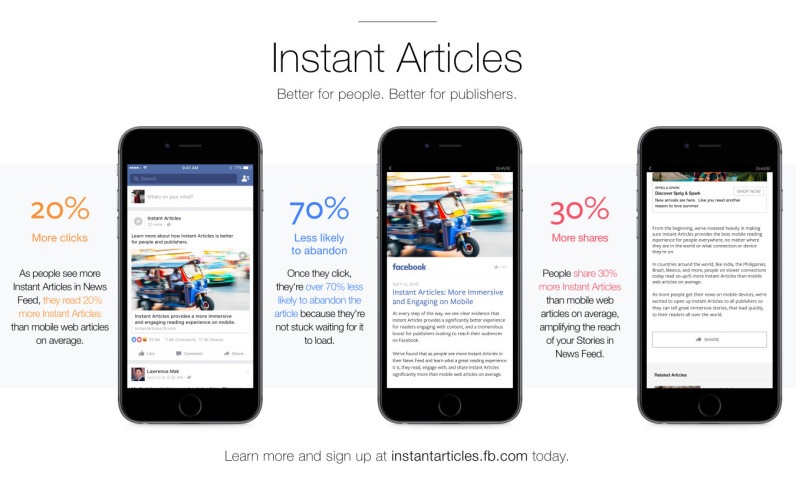Facebook has made its Instant Articles platform available to any publishers looking to take advantage of the faster loading mobile format.

Instant Articles were introduced in May 2015 as lighter versions of articles that load almost immediately.
The company released some stats on the feature, indicating that Instant Articles are read 20 percent more often, have 70% better retention, and are shared 30 percent more often than regular pieces.
The company said that adoption has been “tremendous” with more than 1,000 publishers worldwide. “We see clear evidence that Instant Articles provides a better reading experience for people and a significant boost for publishers looking to reach their audiences on Facebook,” wrote product manager Josh Roberts.
In addition to the general availability of Instant Articles, Facebook has added new partners and tools, including integrations with WordPress, Medium, RebelMouse, ShareThis, Sovrn, Tempest, Adobe Analytics, Chartbeast, Nielsen, Parsely, and SimpleReach.
Branded content is also coming to Instant Articles. The company said that a tag will accompany these sponsored posts, and that publishers can additionally use three more ways to mark such content:
· Visually distinguish branded content from editorial content using our article styling tools.
· Customize text in the byline and kicker to indicate content sponsors.
· Include a sponsor logo on the first screen through a native toolset that is coming soon.
Opening up Instant Articles to all publishers gives Facebook an edge over Google, which has launched its own initiative called the Accelerated Mobile Pages project. Both efforts are designed to avoid slow browser load, but Google’s is open-sourced, meaning that other services like Twitter can use it. However, perhaps one of Facebook’s biggest advantages is the social aspect, where you can read an article within the social network and share it right then and there.
Trevor Paulsen, product manager, Adobe Analytics commented on the importance of creating faster mobile experiences, and what this means for the ongoing app vs mobile web battle.
“Time will tell as to whether Facebook or Google’s solution will be more widely adopted. It’s essentially a question of who gets more traffic – Facebook’s app, or Google’s search engine on mobile Web. We see this as an epic app vs mobile Web battle; Facebook wants to keep you in their app, whereas Google wants you in the mobile Web – both for their share of advertising. Publishers will want to implement both to see which is more impactful to their business.”
“In all, we applaud the intention to create faster mobile experiences – the faster an article loads, the more engaging and relevant it becomes. These days, consumers have very little patience. A recent study commissioned by Adobe showed that if digital content takes too long to load, 78% of respondents would switch or stop altogether. Capturing a reader on a mobile device is determined in the milliseconds,” Paulsen concluded.
Read more here
